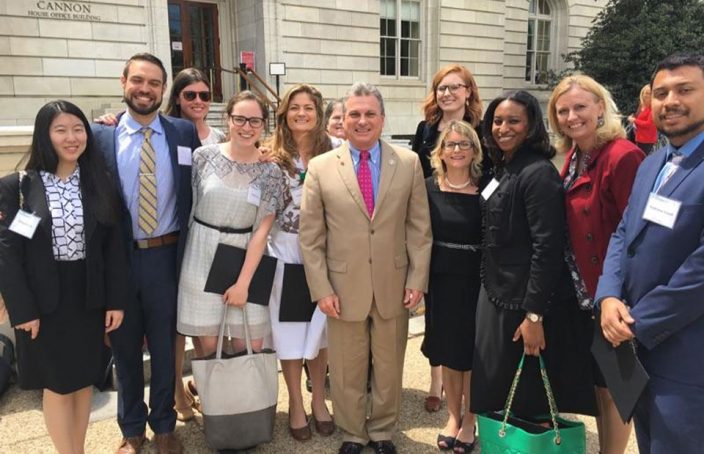ADVOCATING FOR PHARMACISTS ON THE HILL
Written By: Amy Howard, Fourth-Year Student Pharmacist, and Abigail Klutts, Third-Year Student Pharmacist
On May 3, pharmacists and student pharmacists from across the United States gathered on Capitol Hill to take part in the “ASCP Fly In” – an event held in conjunction with the annual American Society of Consultant Pharmacists (ASCP) Forum. Pharmacy advocates, including seven representatives from the University of Maryland School of Pharmacy, brought attention to two bills currently under consideration this legislative session:
- Pharmacy and Medically Underserved Areas Enhancement Act (R. 592/S. 109): This bill intends to revise provider status, as defined in the Social Security Act, to include pharmacists.
- Improving Transparency and Accuracy in Medicare Part D Spending Act (R. 1038/S. 413): This bill seeks to eliminate “clawback” fees required by pharmacy benefit managers (PBMs) after the original point-of-sale.
Advocating Not Only for The Profession, But for Patients
Although both bills could have a positive impact on the pharmacy profession if passed, their impact on patients cannot be understated. Pharmacists have long been recognized as valued members of the health care team; however, we often face restrictions for reimbursement of services because we are not recognized health care “providers.” By gaining provider status under the “Pharmacy and Medically Underserved Areas Enhancement Act,” we would be able to transform health-system models and bolster efforts to provide better preventive patient care, thus improving health outcomes and reducing overall health care costs.
In addition, although the “clawback” fees targeted by the “Improving Transparency and Accuracy in Medicare Part D Spending Act,” are obvious to community pharmacists (particularly those operating independent pharmacies), they usually go unseen by consumers. The higher medication cost originally set at the point-of-sale may not be the actual dollar amount that is reimbursed to the pharmacy. Despite PBMs paying out lower amounts after “clawback” fees, the original, higher claims dollars are what count toward patients’ total Medicare spending. These higher claims dollars cause patients to reach the Medicare coverage gap (also known as the “donut hole”) and subsequent catastrophic coverage level more quickly. For those patients who reach catastrophic coverage, 80 percent of their benefits coverage falls to the federal government and, as a result, taxpayers. If passed, this bill would require PBMs to disclose “clawback” fees at the point of sale, allowing pharmacists to appropriately structure their business models and patients to better understand their insurance coverage.
Understanding the Value of Advocacy as Student Pharmacists
Opportunities such as this to advocate on behalf of our profession are instrumental in helping student pharmacists apply what we have learned in the classroom to our future career endeavors. The Doctor of Pharmacy (PharmD) curriculum is continuously fine-tuned to reflect advances in pharmacy practice, which provides us with the knowledge and skills necessary to take on new patient care roles after graduation.
Beyond the science of medication use, student pharmacists learn clinical implications of disease, ways to positively influence patient behaviors, and means for optimizing medication adherence and health outcomes. In turn, we can often be a source for innovation in pharmacy practice and can use legislative advocacy as a form of self-determination. By vocalizing now where we want to be in the future, we will have the ability to develop practice settings that reflect our unique professional goals.
In addition, patients rely on pharmacists who understand the complex health care system to advocate on their behalf. Pharmacy advocates who work to pass bills like the “Pharmacy and Medically Underserved Areas Enhancement Act” and “Improving Transparency and Accuracy in Medicare Part D Spending Act” serve as stewards of the profession and champions for patient rights. Although legislators have the final say, as elected officials, they recognize the importance of receiving input from their constituency.
Making Your Voice Heard as a Health Care Advocate
The “Pharmacy and Medically Underserved Areas Enhancement Act,” “Improving Transparency and Accuracy in Medicare Part D Spending Act,” and other federal health care legislation can be followed at www.Congress.gov/legislation. The Maryland General Assembly will also meet for its next 90-day legislative session beginning January 10, and can be followed at www.mgaleg.maryland.gov/webmga.

